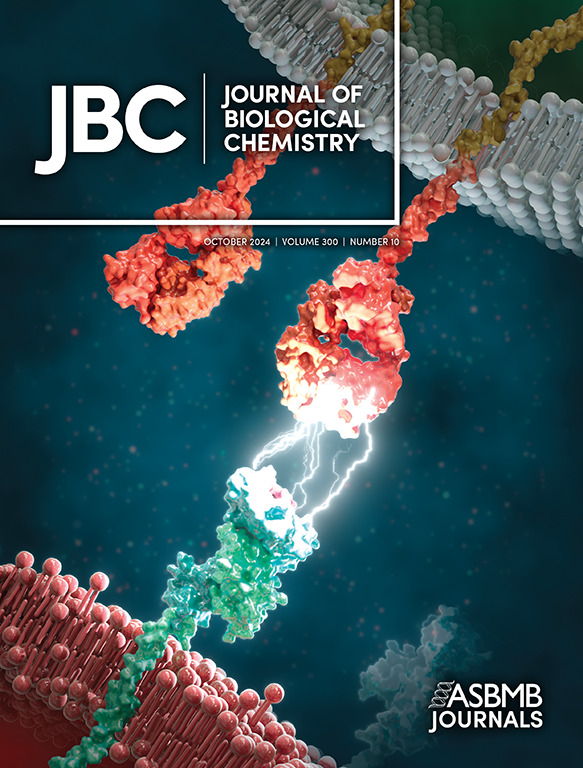基于氯喹的免疫调节药物抑制肿瘤进展的g -四重体特异性作用。
IF 4
2区 生物学
Q2 BIOCHEMISTRY & MOLECULAR BIOLOGY
引用次数: 0
摘要
免疫调节药物,特别是羟氯喹(HCQ)和氯喹(CQ),随着其在自身免疫性疾病和寄生虫病中的广泛应用,正在进行癌症治疗的临床前研究。癌细胞的一个特征是驱动肿瘤进展的癌基因表达升高,通常由位于其上游启动子区域的g -四重体(G4) DNA结构调节。这项研究表明,与其他基于喹啉的免疫调节药物相比,HCQ在致癌DNA(尤其是癌症进展的关键调节因子c-myc癌基因)内最有效地稳定了细胞G4景观。药物诱导的c-myc G4的稳定与其转录活性的显著抑制相关,最终导致TNBC细胞侵袭和迁移的减少。从机制上讲,G4磷酸主链与药物带电侧链之间的强静电相互作用锚定了喹啉基团,增强了与环区和四重奏区的堆叠,从而稳定了G4。体内研究揭示了HCQ增强常规化疗药物疗效的能力,代表了它作为辅助治疗的合理候选者。本研究描述了免疫调节剂药物的一种非常规抗癌机制,通过g4依赖性稳定对c-myc癌基因施加优先转录抑制,揭示了肿瘤干预的新策略。本文章由计算机程序翻译,如有差异,请以英文原文为准。
G-Quadruplex Specific Action of Chloroquine based Immunomodulator Drugs to Inhibit the Cancer Progression.
Immunomodulatory drugs, particularly hydroxychloroquine (HCQ) and chloroquine (CQ) are in the preclinical investigation for cancer therapy, along with their extensive application in autoimmune and parasitic diseases. A hallmark of cancer cells is the elevated expression of oncogenes that drive tumor progression, often regulated by G-quadruplex (G4) DNA structures located within their upstream promoter regions. This study elucidates that HCQ stabilizes the cellular G4 landscape most efficiently compared to other quinoline-based immunomodulatory drugs within oncogenic DNA, particularly the c-myc oncogene, a pivotal regulator of cancer progression. The drug-induced stabilization of c-myc G4 correlates with significant suppression of its transcriptional activity, culminating in a reduction of invasion and migration of TNBC cells. Mechanistically, the strong electrostatic interaction between the G4 phosphate backbone and the drug's charged side chain, anchors its quinoline group to enhance stacking with loop and quartet regions, stabilizing the G4. The in vivo investigation unveils the HCQ's capacity to potentiate the efficacy of conventional chemotherapeutic agents, representing it as a plausible candidate for adjunctive therapy. This study depicts an unconventional anticancer mechanism of immunomodulator drugs, wherein it exerts preferential transcriptional repression of the c-myc oncogene through G4-dependent stabilization, unveiling a novel strategy in oncological intervention.
求助全文
通过发布文献求助,成功后即可免费获取论文全文。
去求助
来源期刊

Journal of Biological Chemistry
Biochemistry, Genetics and Molecular Biology-Biochemistry
自引率
4.20%
发文量
1233
期刊介绍:
The Journal of Biological Chemistry welcomes high-quality science that seeks to elucidate the molecular and cellular basis of biological processes. Papers published in JBC can therefore fall under the umbrellas of not only biological chemistry, chemical biology, or biochemistry, but also allied disciplines such as biophysics, systems biology, RNA biology, immunology, microbiology, neurobiology, epigenetics, computational biology, ’omics, and many more. The outcome of our focus on papers that contribute novel and important mechanistic insights, rather than on a particular topic area, is that JBC is truly a melting pot for scientists across disciplines. In addition, JBC welcomes papers that describe methods that will help scientists push their biochemical inquiries forward and resources that will be of use to the research community.
 求助内容:
求助内容: 应助结果提醒方式:
应助结果提醒方式:


